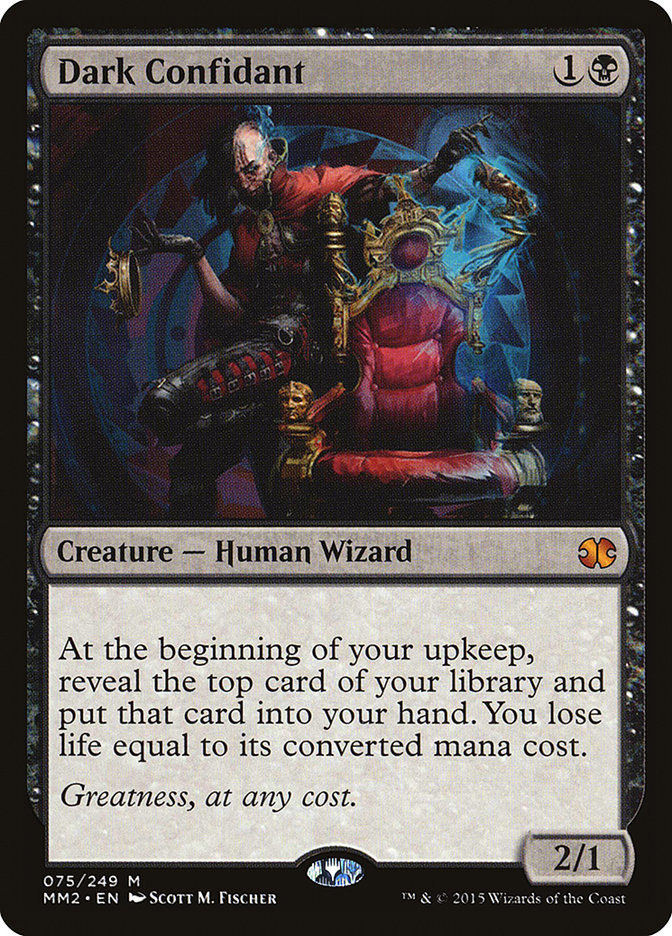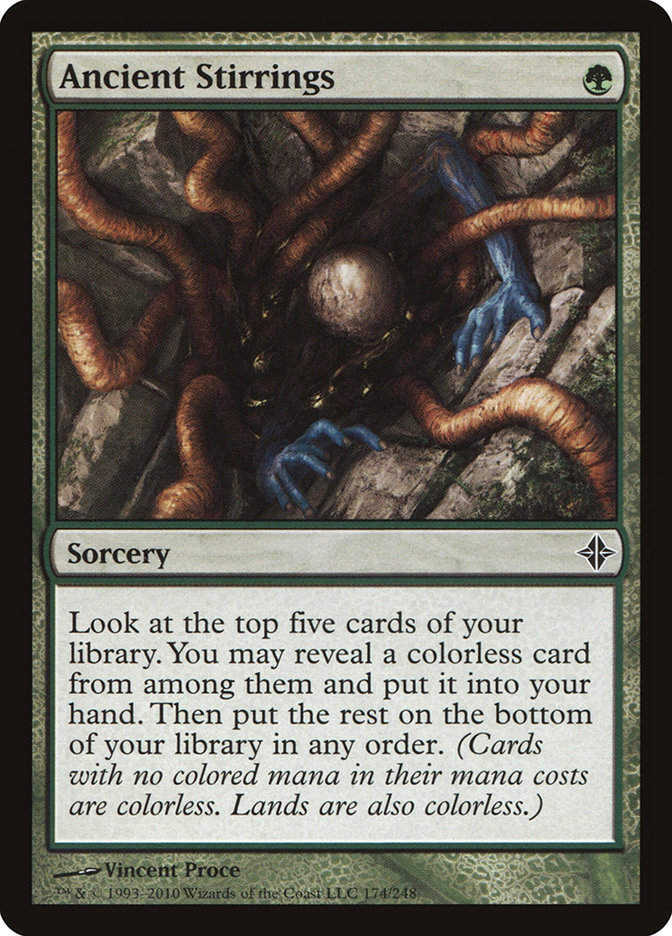These last few weeks, I haven’t been able to get out in the world and play much Magic: The Gathering. Between work stuff, preparing for my in-laws visiting us for the first time, my in-laws visiting us for the first time, trying to figure out just what the heck is going on here, and just normal married-doggy-daddy-type stuff, I have been swamped.
That doesn’t mean that I’m not constantly thinking about the game, and I don’t just mean shuffling up cards to play, or what style of Death’s Shadow deck is going to win the next Modern Open or Grand Prix. I tend to think a lot about what I like to call “best practices” and things that I can do to work on shoring up the mental aspect of my game. I have written pieces in the past with nuggets of wisdom, but times change, and I think that revisiting ways to step up your game is a good exercise. In just about any Q&A session I do, I am asked, “What’s the one thing you would say that I can do if I want to go from winning my local FNM to winning a PPTQ or GPT?”
Usually my answers to this aren’t as quick and short as I would like, and I think that taking two important best practices and expanding on them can be helpful.
Before I start, though, if you enjoy reading about things that you can do to step your game up to the next level, I highly suggest checking out a lot of the pieces that Jadine Klomparens has been writing over on the Select side of the site. They are awesome and the way that she breaks down the different aspects of the game and how to interpret them are among the best I have ever read.
Best Practice #1: Play to Win
The first thing that I want to drive home is playing to win. This doesn’t mean exactly what you would think, though. I’m not talking about winning at any cost.
I’m not talking about always playing a tried-and-true deck and never trying to innovate, although that discussion comes up a lot in the realm of trying to take your game to the next level. What I am talking about is inside the game, in that heated moment when you feel like you’re behind and self-preservation kicks in and all your instincts are telling you to chump block that creature so that you can live an extra turn.
The biggest point in my career when I felt like I started to “level up” and take my game to the next level was when I stopped asking, “What do I need to do so that I don’t die?” Instead I asked:
Question #1: “I’m behind, so how do I win this game?”
Magic is at its base a strategy card game. There are differing levels of skill that can be found amongst its players, and that skill has a huge impact in the success of the players, but there is also variance, and the best players in the world can mitigate that variance when they must and use it to their advantage when they can.
I’m sure everyone has heard many bad beat stories and it’s easy to empathize with whoever is telling the story, but think about the big picture. There are two sides to that coin, and while their opponent may have gotten lucky and drawn the only card that would let them win the game in that situation, there may be a little more going on than we realize.
In those games where we are behind and need a certain thing or sequence of things to happen, there is a choice that must be made. We must choose: will we play to win, or just try not to lose?
There have been plenty of games where I am absurdly far behind. For me to win the game, A, B, and C must happen and then I have to draw Card X.
It may not be likely, but a nonzero chance to win is better than just losing the game eventually if you are treading water or making futile attempts to stop your opponent from winning. Once we have an out, we have to play to it. We must take game actions that lead us to that specific point and facilitate that plan, and stick to them.
Now, think back to that last bad beat story you heard. Yes, their opponent may have drawn that last haste creature that they needed to close the game out, but what we don’t get to hear about is how they traded aggressively to reduce the potential blockers on the last turn. We don’t get to hear about how they used a Path to Exile on their own creature to ensure that they had the mana to cast the lethal haste creature that they didn’t even have in their hand at the time. We don’t get to hear about how they chumped with a creature when it looked like it was too early, but it was all according to their plan on how they could actually win the game.
Likewise, how often have you been extremely far ahead, and then suddenly your opponent comes back and wins a game that you were sure there was no way you could possibly lose?
In those games where I feel like I am so far ahead that a meteor would have to fall through the roof of the building and land on top of my head but also miss my opponent, I like to ask myself the following:
Question #2: “I’m ahead, so what must happen for me to lose this game, and what can I do to stop that from happening?”
Could that same bad beat story have been prevented? Could we have afforded to be a little more conservative with our actions, maybe saving that “extra” removal spell? Could we have been more aggressive to end the game a turn earlier to cut off the number of draw steps that our opponent got?
Whether you’re ahead or behind, have a plan to win and play accordingly.
Best Practice #2: Don’t Be Afraid to “Netdeck”
I generally avoid talking about netdecking when people ask me on a one-on-one basis on ways to get better, but I think that it’s important to consider what your goals are in MTG. Are you interested in being successful with something of your own design, or are you just interested in getting better and being successful?
The idea of “netdecking” is quite archaic, to be honest. Back in the fledgling days of the internet, not everyone had ready access to data on decklists, so it was seen as disingenuous to use a list that wasn’t of your own design. People took pride in figuring out card interactions and bringing their own creations to a tournament or the kitchen table.
Now, decklists are everywhere and almost everything has been done. The thought that no one else has thought to add Card X into their Winding Constrictor deck is pretty wild to me, but I can understand the allure behind having something be your own.
It all comes down to what is important to you. If you want to win a PPTQ or Top 8 an Open, you certainly can do it with a brew of your own making, but the odds are much better if you are doing so with an already established deck that you have practiced with and know the match ups inside and out.
A question that I always ask myself when I am trying to brew a new deck or work on an idea:
Question #3: “Is my deck a worse version of something that already exists?”
I had many different decks that I tried to brew in the Theros/Khans of Tarkir era that were scrapped because they were just bad versions of Abzan Midrange. It certainly is cool that you have added Card X to your deck, but why? If the answer is “why not” or “because it’s my favorite card”, then please don’t be surprised when you fall short in an event.
Now, I want to make it perfectly clear that I am not against brewing or wanting to try something different. In fact, I think that Modern is a perfect format for that. Just look at what Todd Stevens has been able to accomplish.
Creatures (27)
- 1 Azusa, Lost but Seeking
- 2 Birds of Paradise
- 4 Tarmogoyf
- 4 Noble Hierarch
- 4 Knight of the Reliquary
- 2 Scavenging Ooze
- 3 Voice of Resurgence
- 4 Courser of Kruphix
- 1 Tireless Tracker
- 2 Renegade Rallier
Lands (23)
Spells (10)

Four key points:
#1: There is nothing wrong with “netdecking.” Playing a stock list or tweaking a list that someone else succeeded with is perfectly fine. If you want to be successful and get better at MTG, playing successful decks and learning about why they were successful is the perfect way to do so.
#2: There is nothing wrong with brewing. Playing your own list and taking pride in playing something you created is an awesome feeling. I love seeing people talk about how proud they are of their creations.
#3: Understand the goals of these different mindsets. “Fun” for some people is completely different.
#4: Being condescending towards either group is weak. Thinking less of someone for wanting to increase their chances of being successful by playing a tried-and-true deck only reflects poorly on you. Likewise, talking about how someone’s brew is bad and needs to stay at FNM or at the kitchen table also reflects poorly on you.
Most people who reach out to me fall into the “netdecking” camp, but when I get more into conversation with them, I can tell that they have heavy roots in brewing. They’ve taken an established deck and added their favorite card or built some theme into the deck and are looking for feedback on it.
Most of the time, my feedback is to ask why they changed the list that already won a Grand Prix or made an Open Top 8. There are definitely times that the changes make sense and we can collaborate on their idea and flesh it out, but most of the time, it’s more along the lines of “I like this card” or “I have a foil Japanese one, so I wanted to play it.”
It does all come down to goals and figuring out the best course of action to meet those goals. I’ve implemented this process in other aspects of my life. It’s been extremely helpful and I recommend it.
Wanting to transition from one mindset to the other is perfectly fine, too, but it does involve being honest with yourself and changing your focus to learning “why” as opposed to just tinkering with “what.”
I would love to hear your opinions on my two best practices, three questions, and four points. Please let me know what you think, especially if there are any particular situations where you were able to apply them to help yourself level up in Magic.




